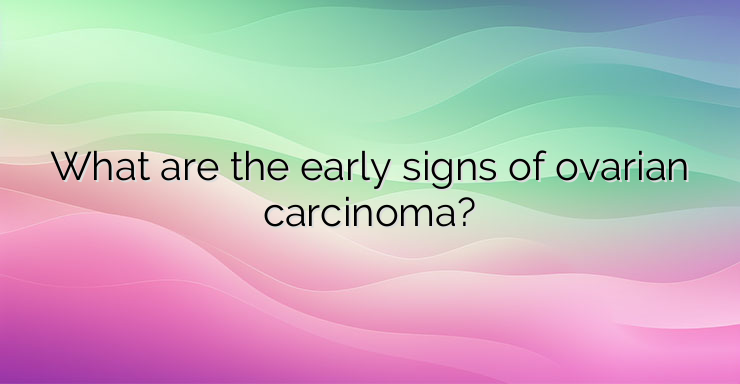The ovaries are two reproductive glands that produce eggs as well as the female sex hormones estrogen and progesterone. About 21,750 women are diagnosed with this disease each year. Ovarian cancer occurs when abnormal cells in the ovary begin to multiply out of control and form a tumor mass. If not treated promptly, the tumor can spread to other parts of the body. Ovarian carcinoma often has warning signs, but the earliest symptoms are vague and easy to dismiss. Only 20% of cases of the disease are detected at an early stage. Early symptoms are easy to ignore because they can resemble other common illnesses or tend to come and go periodically. Signs of the early stages of the disease include: Abdominal swelling, feeling of pressure and pain; Unusual feeling of fullness after eating; Difficulty eating; Frequent urges to urinate; Fatigue; Indigestion; Stomach acids; Constipation; Back pain; Menstrual disorders; Painful intercourse. It is important to note that these symptoms can occur for many other reasons and are not necessarily due to malignancy. Many women have some of these symptoms at different stages of their lives. These types of complaints are often temporary and respond to simple treatments. After the applied symptomatic treatment, the complaints will subside if it is not a malignant disease. Symptoms usually become more severe as the tumor grows over time. Types of ovarian cancer The ovaries are made up of three types of cells, each of which can develop into a different type of tumor. Epithelial tumors form in the layer of tissue on the outside of the ovaries. About 90% of all ovarian cancers are classified as epithelial tumors. Stromal tumors. They grow in hormone-producing cells. 7% of cases of ovarian malignancies are proven stromal tumors. Germ cell tumors develop in the cells that produce eggs. They are very rare. Is there a risk of ovarian cysts becoming malignant? Most ovarian cysts are not cancerous and are called benign. An ovarian cyst is a collection of fluid or air that develops in or around the ovary. Most cysts form as a normal part of ovulation when the ovary releases the egg. They usually cause only mild symptoms such as bloating and go away without treatment. The appearance of cysts is more disturbing in cases where the woman concerned is not ovulating. The exact cause of ovarian cancer is unknown, but there are some factors that increase the risk: Family history of ovarian cancer; Mutations in genes associated with ovarian cancer such as BRCA1 and BRCA2; Breast cancer history,uterus or colon in the past; Obesity; Hormonal therapy; Endometriosis Having any of these risk factors does not necessarily mean you will develop ovarian cancer. And vice versa – the absence of risk factors does not protect you. Most cases of ovarian carcinoma develop after menopause.


Leave a Reply